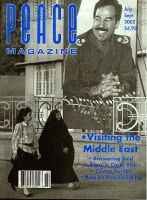
Peace Magazine Jul-Sep 2002, page 29. Some rights reserved.
Search for other articles by Rene Wadlow here
Aldershot: Ashgate, 2000, 4l8 pp
The title of this book would have been more accurate were it "International Relations in the Middle East" for the countries of the Middle East are not actors but subjects of the foreign policies of the Great Powers. In fact, the book is largely devoted to the policies in the Middle East of the United States, Britain, the Commonwealth, the European Union and the residual interests of Russia and post-Communist Eastern Europe. The strongest sections are those by Jeffrey Helsing on US policy, largely oriented toward oil supplies and the Israel-Palestine conflict, and Philip Marfleet on the European Union's Euro-Mediterranean Partnership presented in Barcelona in 1995.
The sustained confrontation between dominant external interests and regional politics is the framework of the book. As Jeffrey Helsing points out,
"Even with the end of the Cold War, many of the same problems have continued in the region or have actually gotten worse. Despite the turnover of a few leaders, little change has ocurred politically within most Arab societies and their governmental systems. Religious fundamentalism remains strong within the region, often continuing its broad-based appeal to many disenfranchised or disaffected sectors of society. This reflects a growing divide between the haves and have-nots in society. In addition, the scarcity of natural resources such as water, arable land, and the pressures of high population growth increase the risks of conflict, both within countries and between them. Finally, on top of each of these issues, one must impose the fundamental conflict that still exists between Arab nationalismand Zionism as well as the competing claims for the same land among Palestinians and Israelis."
Despite a tradition of pan-Arab rhetoric and a few common heroes such as Gamal Abdul Nasser, the States of the region have never been able to evolve a common response to external intervention into Middle East politics. The "oil weapon" which many in Europe feared after the 1972 rise in oil prices was a short-lived threat and never created a broad common policy among the Arab states.
BALANCE OF POWER
Rather than moving toward regional unification, and in the absence of a just and comprehensive integrating peace environment, the Middle East has remained a society of territorially-based states which interact largely on the basis of a balance of power. No single state is allowed to become too powerful or hegemonic, and no state is allowed to be abolished. However, as Nicholas J. Spykman wrote of earlier balances of power in Europe,
"The truth of the matter is that states are interested only in a balance which is in their favor. Not equilibrium, but a generous margin is their objective.The balance desired is the one which neutralizes other states, leaving the home state free to be the deciding force and the deciding voice."
As Richard Falk notes in his chapter, the Middle East remains more state-centric, even if the state is weak, than other world regions where market, technological, ideological, and civilizational currents have advanced toward a global world society. However, many socio-ecological questions are not bound by the territorial state: water use and water contamination, demographic pressures and the dangers of ecological breakdowns are all transboundary problems. As Hilal Elver writes in "Hydropolitics in the Middle East," "The diverse and opposing nature of ethno-religious groups in the Middle East, which includes Turks, Kurds, Arabs and Israelis, makes the management of scarce water resources a precarious venture in diplomacy, and adds to the difficulty of achieving cooperation."
Built into a balance of power system is mistrust of the leaders of other states. It is a system based on permanent confrontation. Cooperation is limited to coalition building to oppose a stronger State or a stronger coalition. Morton Kaplan in his System and Process in International Politics (New York: J.Wiley, 1957) sets out the rules for the functioning of a balance of power system. Kaplan also tried to show how a balance of power system could be modified but warned that in practice state leaders prefer to tinker with a system they know than to move toward the unknown. Thus many Arab States are fearful that too close cooperation with the European Union will lead to an integration which will resemble colonialism, and that globalization is a cover for US interests.
But for their part, many in Europe fear Islamist opposition groups and the movements of migrants who would settle in Europe. They fear a Muslim crescent cutting around the southern and eastern edges of Europe. It will not be easy to move from this balance of power mentality to one of world unity, but the dangers of permanent confrontation in the Middle East must encourage us to try new approaches.
René Wadlow is an academic with interests in the peace movemment.

Peace Magazine Jul-Sep 2002, page 29. Some rights reserved.
Search for other articles by Rene Wadlow here